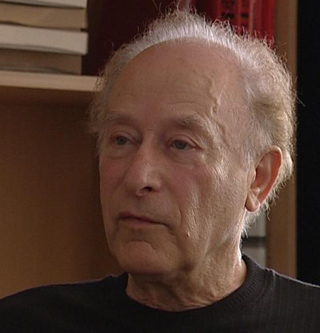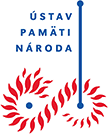Tibor Spitz (1929)

Biography
“And that is Holocaust… Helpless nation, peaceful nation was being robbed and in case people would request their properties back, they were killed, and their inheritors were killed as well – just to make sure.”
Tibor Spitz was born in 1929 in Dolný Kubín. His father was a cantor in Jewish religious community and his mother worked as a teacher. They did not leave to Poland with first transports in 1942 because his father had a very important role in that area – he buried Jews from all over Orava territory and Tibor with his brother helped him. According to an agreement the whole family was supposed to be “resettled” with the last transport. Tibor's parents were educated, they spoke various languages and besides that his mother learned about the horrors from A. Hitler's book Mein Kampf, they were informed about the reality of Auschwitz from escapees who bribed the engine-driver and crossed the borders in railmen's uniforms. The fact that Tibor's closest relatives were all deported into the concentration camp yet increased the horror and fear from the back then situation. After the Slovak National Uprising began in 1944, they decided to hide in the forest. They dug a bunker and survived there whole 7 long and cruel months – from September 1944 until April 1945. However, the forest was not the safest refuge. They had to face the danger not only from the Gestapo side, but also from Ukrainian rebels – Banderas. Luckily, Tibor and his family were able to escape from them at the very last moment. On April 4, the villagers who knew about their bunker came to announce them the liberation of Dolný Kubín. Because of the Aryanization of their whole property, they were forced to start from the very beginning. After the war, Tibor Spitz graduated in university and became an expert in the glass industry. In 1968 he emigrated through Cuba into the USA where he lives until today.
Big Yellow Star
Tibor Spitz - Big Yellow Star (data format Flash Video)
“We had to wear that big yellow star that was about 4 inches in diameter. Then there were so-called “people with exceptions” who were allowed to wear a smaller 2-inch star edged in blue. These were the Jews important for the national economy, for example, pharmacists, because almost all pharmacists in Slovakia were Jews.”
Agreement
Tibor Spitz - Agreement (data format Flash Video)
“There was such an agreement that we would have gone with the last transport when there hadn´t been any Jews left. In the villages and towns of Slovakia there was a contest with a great award declared. That town where no Jews would be living anymore, they called it “Judenrein”, would have won this contest and the mayor, the town, would get the award. And when there wouldn´t had been any Jew in Orava to be buried, then we would have gone with the last transport away.”
Aryanization not according to Race, but according to Religion
“We looked like just the same. Among Jews there were many blue-eyed and blond-hair people like I was or my parents and grandparents were. Citizens of Dolný Kubín were in majority brown-eyed and having dark hair. So there could be nothing said about the race and actually, it all was just fabricated. The whole Aryanization thing was not according to race, but according to religion.”
Jewish Origin
Tibor Spitz - Jewish Origin (dat format Flash Video)
“That Secret Police or also the Police went and searched in parish registers who was when being baptized. And this way the normal man being his whole life Catholic, going to church as well as his parents who never heard anything about their grandparents having the Jewish origin, because they also used to go to church, suddenly found out they all were actually Jews. They came to know that their property would be confiscated and that they would be sent to some settlements to the East. There, they were said to be living in their own state until the end of the war.
If the Germans won the war, afterwards we would see what would happen with us. We supposed we would work for the German Reich as manual workers, help the war efforts and so on. Nobody told us: “You Jews will be taken to some concentration camp and there we kill you.” If they had told us, great panic would have probably arisen. No one knew this until the very last moment; until the time when they took the people into that [room] telling them they would be disinfected after the long journey, ordering them to get undressed and be washed. And instead of the shower they were poisoned by some gas.”
Postcards from Relatives Being in Poland
Tibor Spitz - Postcards from Relatives Being in Poland (data format Flash Video)
“We eschewed deportations also because already in summer of 1942 (deportations began in the spring) we had found out where were the deportees taken. The first information was very interesting. Few weeks after the first transport we started to receive [postcards], not us in particular though, because our relatives didn't probably know our address, but many people were receiving these postcards. It firstly began by transporting young people and then also the whole families followed, so the postcards contained such lines as: “To all our relatives, friends, and neighbors… We like it here very much. It is exactly like what they told us. We are building the life together and don’t worry, come here too. We are looking forward to see you! With love…” And such postcards began to come from Poland or Ukraine, where these people were transported. However, the postcards did not come at once, but every week somebody got one or two… People believed that was true and they were quite contented.”
Psychologically They “Got Us”
Tibor Spitz - Psychologically They “Got Us” (data format Flash Video)
“At first, they took all our property and jobs and expelled our children from schools. Gradually we became hungry and cold because they took away all our clothes and sheepskins and suddenly the life was really poor. We weren't allowed to talk to anyone, others couldn't speak with us and so we had nothing to live off. We didn't have any food, neither we had firewood, so we needed to go and pick some in the forest, but majority of people didn't have such an opportunity. Then all of a sudden the government said: “Why should you live here amongst people who don't like you? We don't want you here; therefore we take you to another country where you will live together. You can learn different crafts, build houses and work, and we all will be happy.” So this is how psychologically they made us to say: “Great! Why should we live straggling when nobody likes us here? There we will live together.”
Painful News from Poland
Tibor Spitz - Painful News from Poland (data format Flash Video)
“Suddenly I realized how they killed them all. That was an unbelievable shock for such a twelve-year old boy. My brother was fourteen and he suffered from that even more than I did. My mom screamed, cried, and asked how is that all possible and we just tried to soothe her. My dad threw himself on the bed, with his face down and angry, because it was really a great affliction. If we imagined any person to whom someone said: “Your whole family got killed in a car accident,” if nothing else, this would have been a huge wound enough. And these were organized deportations and the worst of all was that we knew we were going to be the next ones. We knew it's not only them, but that there will be others, that there will also be us.”
Big Jewish Cemetery
Tibor Spitz - Big Jewish Cemetery (dat format Flash Video)
“Slovaks are such a civilized nation! Can you imagine there would be a priest who sent people to death and yet paid for moving them away?” Seriously, not even one man believed this would have been true. However, we absolutely believed because we spoke to those people [escapees] and they described it in such a detail that we had to believe. And we completely tried to eschew getting into the cattle wagons going that direction. That is why I am able to sit here today, talk to you and be alive, alive without disappearing up the chimney. Moreover, they also told us that at first, the ashes were dispersed to the river, I guess it was called Visla, but then they corrected it - they put it into sacks with the sign: “fertilizer” and they sold it to German farmers. So the whole Europe now is scattered with fertilizer that are the human bones. It's such a big cemetery, whole Europe!”

Updated at: 13.07.2010
Print Tweet